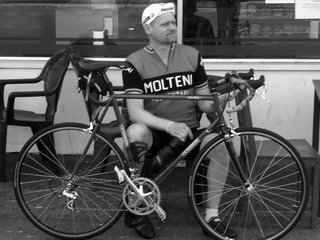I have spent the last couple weeks visiting other folks’ classes and thinking about what I wish I was writing about (rather than writing). This thinking about but not actually writing points me to a quality of life (indeed, I vacuumed the house in the middle of composing this post). What gives me pause is a question about whose life. I can accept that my inaction is mine, can even do something about that. But what if, as I suspect, this quality of life has to do with being a teacher.
Here’s the worry. We (the society that I am a part of) have established the role of teacher in such a way so as to almost assure that teachers won’t write much, because writing is not of value to them or because they cannot write and also be a teacher very easily.
Two things occur as I work out this line of thought. The first is the role “teacher.” I use this noun to designate a human that is vocationally committed to working among learners in an attempt to optimize learning. The setting of that work—public or private, primary or secondary—changes the focus of the teacher but not, I think, the nature of the work. Interestingly, some “educational” settings have slots carved out for teachers. A kindergarten classrooms and middle school math classes are places where teachers ply their trade. A “teacher” may find other versions of school less native to the role or habit or intuition or art or whatever it is that we practice. I encountered a few gifted teachers in graduate school but they were the odd person out, professors with the freedom to try an experiment. Louise Schleiner was one of these. I worked with her just after her third book found a publisher, at a point when she began to play with pedagogy. Her seminars began to emphasize revision and audience. She shared draft manuscripts and asked learners to share theirs. She became less interested in midterms and more interested in having students write with a conference or a publication in mind. It strikes me as unlikely that she read much about teaching; English professors didn’t then (unless there were, as John Greppin once remarked, among those young faculty interested “pedagogy”). Easily on her way to full professor, Louise reallocated time to play with teaching. Few of her peers did (though some lectured beautifully).
Like any role players, teachers look for space in which to act. They find support or not; make choices based on what is sanctioned and what risks they are willing to take. As I look around me, I wonder whether the post-No-Child-Left-Behind U.S. has much interest in learning. We want test scores and want to maximize human assets, but probably are fairly disinterested in calling some of our community to work among learners to optimize learning. That smacks of socialism or affirmative action. It has historically been “women’s work,” and we have been disinclined to resource that.
My second reflection has to do with what writing is and does. I remember Earl Anderson taking about someone who got a first job at what seemed to Earl a "fourth-tier" college (maybe even a community college) and who “published his ass off to get out of there.” I remember being struck by this conversation. In my third or fourth year away from graduate school, I like teaching and saw the work of a community college teacher as attractive. Earl's tone suggested that he could view teaching as something that one did between more interesting ventures (though his students vouched for his teaching--interesting wrinkle). Earl was moving toward the end of his career as a professor and finding that his work was finding a more and more receptive audience. I wonder now about writing to escape. A lot of us do it, but I am suspicious that escape is not what I am after when I say I want to write. Rather, I see act, the act that is working out this sentence, as ethical participation with a community (Ricouer’s little ethics from Oneself as Another comes to mind here as it often does). The writers that I care about are doing what Achebe talks about in “What Does Literature Have to Do with It?” They are (we are?) working out alternate realities but in rhythms that draw communities into considering living alternately. They are channeling traditions and habits and energy into paths that readers consider and enact or reconstruct. We publish to escape, perhaps; we write to dig in.
Teachers, on this line of thinking, need to write. On my experience, most of them, at least in the public system, have to fight to find time and resources to do write, have to sacrifice teaching or family to do this.
Seems like grounds for a work stoppage.
Sunday, November 25, 2007
Subscribe to:
Posts (Atom)
